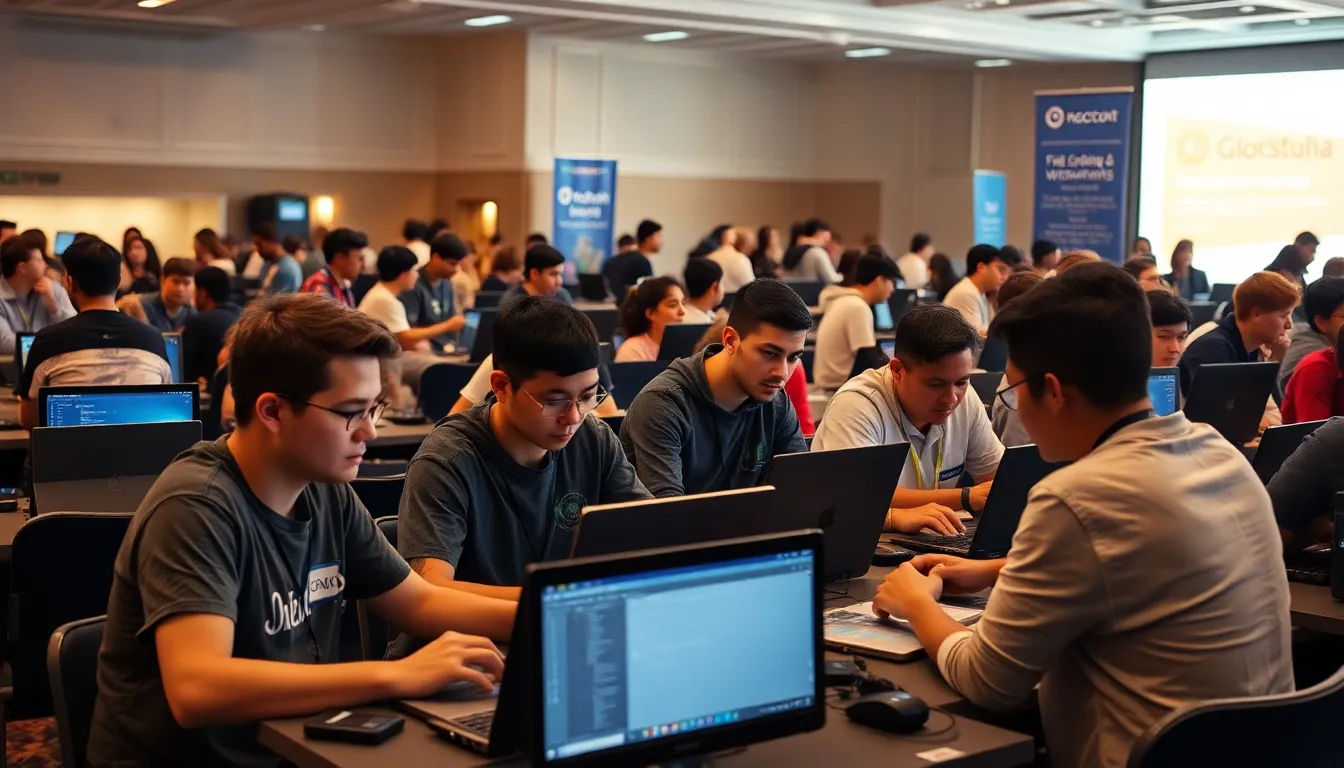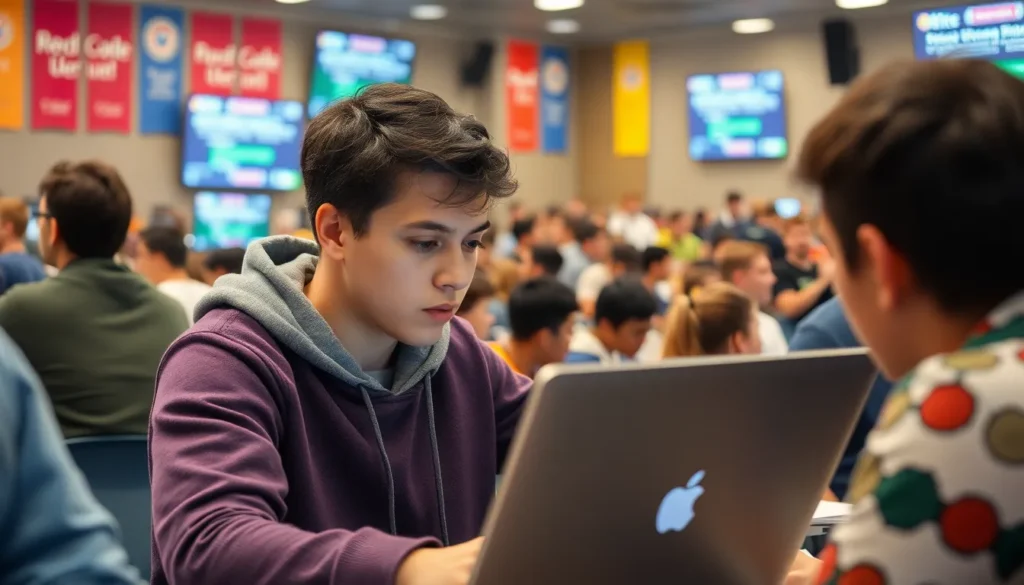Table of Contents
ToggleIn a world where coding is the new superpower, programming competitions are the ultimate battlegrounds for tech-savvy warriors. These contests aren’t just about flexing coding muscles; they’re a thrilling mix of creativity, logic, and a dash of caffeine-fueled adrenaline. Picture this: a room full of bright minds, keyboards clacking like a symphony, and the sweet smell of competition wafting through the air.
Overview Of Programming Competitions
Programming competitions serve as platforms where coders showcase their skills in problem-solving and algorithm design. Participants face challenges that test their creativity, logical reasoning, and ability to work under time constraints. Events include local, national, and international contests, accommodating all skill levels.
Competitors often find themselves solving a series of algorithmic puzzles, working individually or in teams. These contests attract tech enthusiasts eager to validate their programming expertise. Renowned competitions, like ACM ICPC, Google Code Jam, and Facebook Hacker Cup, help elevate participants’ visibility within the tech community.
In a programming competition, participants code solutions that solve problems defined by the contest organizers. Scoring typically depends on the accuracy of solutions and the time taken to submit them. Time constraints add intensity, pushing competitors to optimize their code for efficiency and effectiveness.
Mentorship and networking opportunities arise frequently within these events. Coders can connect with industry professionals, gain insights into the latest technologies, and explore potential job opportunities. Many contests foster a spirit of collaboration, encouraging participants to share tips and strategies.
Moreover, programming competitions often promote innovation and skill development. Aspiring developers can learn new programming languages and techniques through engagement in these contests. Continuous participation can also lead to improvement in problem-solving abilities and algorithmic thinking.
Programming competitions represent a vibrant aspect of the tech landscape. They offer unique opportunities for growth, learning, and achievement for participants across various levels of expertise.
Types Of Programming Competitions

Programming competitions can be categorized into various types, each offering unique experiences and challenges. Participants can engage in either online or onsite formats.
Online Competitions
Online competitions provide flexibility, allowing participants to compete from anywhere with internet access. Numerous platforms host these events, including Codeforces and HackerRank, facilitating a global participation base. Challenges typically feature a series of algorithmic problems that require quick thinking and efficient coding. Contestants submit their solutions through the platform, where automatic judging takes place. Many online events occur regularly, giving coders the opportunity to practice continuously. Participants can often find leaderboards that display rankings, creating motivation to improve their skills.
Onsite Competitions
Onsite competitions take place in physical venues, fostering an exciting atmosphere. Events like ACM ICPC and Google Code Jam finals bring together the best talent in person. Contestants collaborate with teammates or compete individually against a time limit. These challenges not only test coding abilities but also emphasize teamwork and communication skills. Participants often experience the thrill of live judging, where immediate feedback adds to the intensity. Networking opportunities abound, as attendees interact with peers, mentors, and industry professionals.
Skills Developed Through Programming Competitions
Programming competitions foster essential skills in participants. Coders develop a broad range of competencies, enhancing their capabilities in the tech field.
Problem-Solving Skills
Participants face complex challenges that demand innovative thinking. They refine their analytical approaches by dissecting problems into smaller, manageable tasks. The necessity of quick thinking drives participants to devise efficient solutions under time constraints. These competitions require understanding various algorithms and data structures to tackle problems effectively. Exposure to diverse problem types sharpens their adaptability and creativity. Regular practice in contests aligns closely with real-world scenarios, improving overall problem-solving abilities significantly.
Teamwork And Collaboration
Team-based competitions emphasize the value of collaboration among participants. They learn to communicate ideas clearly and efficiently with team members. Successful teams often leverage individual strengths to achieve collective goals. Engaging in discussions and brainstorming fosters a collaborative spirit, enhancing interpersonal skills. Participants experience the dynamics of working under pressure, which mirrors real-world industry settings. These opportunities also cultivate a supportive environment that encourages sharing strategies and knowledge. Developing such teamwork skills proves invaluable in software development and project management roles.
Popular Programming Competitions
Programming competitions draw numerous participants eager to showcase their skills. Several renowned contests have earned a reputation for their challenging problems and prestigious standing in the tech community.
ACM ICPC
ACM ICPC, the International Collegiate Programming Contest, has a long-standing history dating back to 1970. Universities from around the globe participate, representing their regions in a fierce battle of problem-solving skills. Teams of three solve algorithmic puzzles within a fixed time, typically five hours. This competition emphasizes strategy and collaboration, requiring participants to distribute tasks effectively. Notable past winners include institutions like Harvard and Moscow Institute of Physics and Technology. Its multiple levels, from local contests to the prestigious World Finals, highlight the event’s competitive nature and encourage teams to refine their skills.
Google Code Jam
Google Code Jam attracts skilled coders worldwide, offering challenges that test their coding prowess. Participants solve a series of algorithmic problems that increase in difficulty as the contest progresses. Each round narrows the field, ultimately leading to the finals where the top competitors compete for cash prizes and recognition. Google sponsors the event, enhancing its visibility and draw within the tech community. The competition emphasizes quick thinking and efficient coding, pushing participants to optimize their solutions for the best results. Many past contestants have leveraged their experience to enhance their careers, making this contest a significant stepping stone in the programming landscape.
Tips For Success In Programming Competitions
Success in programming competitions involves thorough preparation and effective strategies on competition day. Following these tips helps maximize performance and enjoyment.
Preparation Strategies
Practice consistently by solving a range of problems across various topics. Establish a study schedule that includes regular algorithm challenges and previous competition problems. Engage in mock contests to simulate the competition environment. Review personal solutions and analyze others to learn different approaches. Gather resources, such as textbooks and online courses, to deepen understanding of algorithms and data structures. Collaborate with peers to share insights and strategies, fostering a supportive learning environment. Focus not just on coding skills but also on time management to enhance overall efficiency.
Competition Day Tips
Start the day with a good night’s sleep to ensure peak mental performance. Arrive early to acclimate to the environment and set up equipment. Read through all problems carefully before starting to identify personal strengths and weaknesses. Prioritize solving the easiest problems first, as they build confidence and score points quickly. Manage time wisely by allocating specific time frames for each problem. Keep track of progress and return to unsolved problems later. Stay calm and maintain focus to avoid unnecessary mistakes. Leverage any breaks to relax and reset between challenges.
Programming competitions are more than just coding challenges; they represent a dynamic environment where creativity and problem-solving skills flourish. Participants not only enhance their technical abilities but also gain invaluable experience in teamwork and communication.
These events open doors to networking opportunities and career advancement, making them essential for aspiring developers. Whether online or onsite, each competition offers a unique experience that fosters growth and innovation.
Engaging in programming contests can significantly impact a coder’s journey, equipping them with skills that are crucial in today’s tech-driven world. The thrill of competition and the pursuit of excellence continue to inspire coders to push their limits and achieve greatness.




